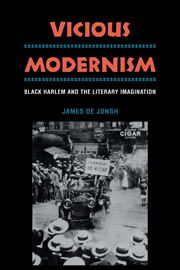Book contents
- Frontmatter
- Contents
- Acknowledgments
- Introduction: Vicious Modernism
- I The Legendary Capital: The 1920s and 1930s
- II The Emerging Ghetto: The 1940s and 1950s
- 5 The Emerging Ghetto
- 6 Go Tell It on the Mountain
- 7 Montage of a Dream Deferred
- 8 Negro de todo o mundo
- III The Inner City: The 1960s and 1970s
- Epilogue: Black Harlem and the Literary Imagination
- Appendix 1 A Checklist of Black Harlem in Poetry
- Appendix 2 A Checklist of Black Harlem in Novels
- Notes
- Index
8 - Negro de todo o mundo
Published online by Cambridge University Press: 05 February 2012
- Frontmatter
- Contents
- Acknowledgments
- Introduction: Vicious Modernism
- I The Legendary Capital: The 1920s and 1930s
- II The Emerging Ghetto: The 1940s and 1950s
- 5 The Emerging Ghetto
- 6 Go Tell It on the Mountain
- 7 Montage of a Dream Deferred
- 8 Negro de todo o mundo
- III The Inner City: The 1960s and 1970s
- Epilogue: Black Harlem and the Literary Imagination
- Appendix 1 A Checklist of Black Harlem in Poetry
- Appendix 2 A Checklist of Black Harlem in Novels
- Notes
- Index
Summary
The decades of the dream deferred in African-American poetry corresponded to the period of liberation struggles throughout the colonized world, from Cuba and Kenya to Indochina and Palestine. Liberation movements of all sorts, quiescent in the face of the Axis threat to “non-Aryan” races during World War II, resumed diplomatic and paramilitary resistance to imperial domination and colonial exploitation after the war. Ironically, self-determination and national autonomy had been advanced by the global war that debilitated the colonial powers, spotlighted the illogic of racist rationalizations for colonialism, and shattered the illusion of Europe's right of dominion. In Africa, the 1950s marked the decisive stage of the liberation struggle. In this same period, the possessions of France and Britain in the Caribbean moved toward autonomy within the French Community and independence within the British Commonwealth. Resistance movements in Cuba and the Dominican Republic challenged, and eventually toppled, dictators sustained by the United States, and Puerto Rico and the Virgin Islands evolved semiautonomous political identities under the Stars and Stripes.
The Harlem motif's legendary character – established in the international glamour of the Harlem vogue and developed in literature by the nativist and negritude movements of the Black Awakening – was affected by these global forces of liberation, as well as by Harlem's disillusioning decline from culture capital to quintessential ghetto.
- Type
- Chapter
- Information
- Vicious ModernismBlack Harlem and the Literary Imagination, pp. 114 - 134Publisher: Cambridge University PressPrint publication year: 1990



